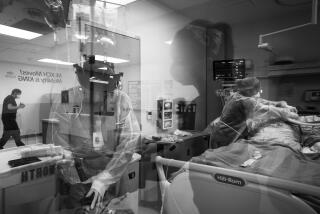Link Between Infections and Heart Disease Bolstered
Recurrent infections of the sinuses, lungs and urinary tract increase the risk of clogged arteries, a new study has found, bolstering the theory that heart attacks and strokes have infectious origins.
Of 826 Italian men and women involved in the five-year study, those who had suffered from common chronic infections were about three times more likely to develop new fatty deposits in the principal artery carrying blood to the brain.
âOur study provides further strong evidence that chronic infection increases the overall risk of blood vessel disease,â said lead author Dr. Stefan Kiechl, a neurology professor at Innsbruck University Clinic in Austria.
Kiechl and his colleagues from Austria and Italy focused on changes in the carotid artery but also detected similar changes in other blood vessels, such as those of the heart. They think the same process is at work in arteries of the neck, heart and legs. Problems occur when pieces of the fatty deposits break off and lodge in a blood vessel, cutting off blood supply and causing a heart attack or stroke.
The researchers suspect that chronic infections somehow promote the clogging process, known as atherosclerosis, by creating inflammation throughout the body. They think that inflammation either from such infections or immune disorders may damage blood vessels, making them prone to plaque buildup.
In the study, blood levels of C-reactive protein, a key indicator of inflammation often used to assess heart attack risk, were elevated among people who had suffered chronic infections.
Previous studies had looked at the role of bacteria in causing heart attacks. The new studyâs findings come as researchers around the world are investigating whether antibiotics or anti-inflammatory drugs can stave off the buildup of the blockages.
âThis is yet another piece of evidence implicating the potential role of inflammationâ and infection in atherosclerosis, said Dr. P.K. Shah, cardiology chairman at Cedars-Sinai Medical Center in Los Angeles. He noted that the study also found a worsening of existing plaque, not just accumulation of new plaque.
Shah cautioned, however, that like all epidemiologic studies, Kiechlâs study shows only an association--not whether the infections actually cause the plaque. Many other factors may be involved.
Kiechl and his co-authors said that because their findings are still preliminary, they were not prepared to advise preventive use of antibiotics. Instead, they advised that people prone to recurrent infections make lifestyle changes, such as quitting smoking, watching their weight and eating fruits and vegetables to reduce their cardiovascular risks.
The study appeared in the latest issue of the American Heart Assn. journal Circulation. It was based on ultrasound scans of the carotid arteries of 826 residents of an Italian community, ages 40 to 79, in 1990 and again in 1995.
Researchers found that 268 of the study subjects suffered chronic respiratory or urinary infections during the study period. After five years, they found that 332 people, or 41% of the patients, had new fatty buildups, called plaques, and that those buildups were three times likelier in the folks who had suffered infections. The relationship was strongest in subjects whose carotid arteries were clear at the beginning of the study.
Although the study linked new plaque to bacterial infections, it failed to find a similar relationship between plaque and viral infections such as shingles and hepatitis B and C.
The notion that chronic infections might cause clogging of the arteries was first suggested in the 19th century, but the idea fell out of favor until the last decade or so.
âI can tell you that most people are paying attention to it now. Theyâre not ignoring it anymore,â Shah said. He has been investigating whether the antibiotic Zithromax, which kills the Chlamydia pneumoniae bacterium responsible for lung infections, can prevent second heart attacks.
Another cardiac researcher, Dr. Joseph Brent Muhlestein of the University of Utah and LDS Hospital in Salt Lake City, said the findings, while âstatistically significant,â were âfar from definitive.â
However, he said that they support the potential role of âpathogen burden,â meaning the repeated assault on the body by infection, in worsening heart disease. Muhlestein has been studying the role of inflammation as well as the role of multiple infections in heart disease risk.
The study âtells us there still appears to be at least some sort of a connection between the infection and the inflammation which may come from it--and who knows--inflammation may be the final common pathway that causes the [plaque formation] to occur,â Muhlestein said.




